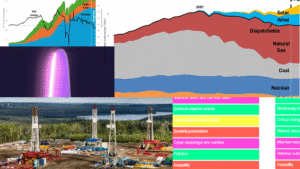
Description
In Part 2 of this Frankly Series, Nate breaks down why energy – and specifically oil – is currently the central foundation of our entire modern economic system. There are ecological and energetic laws that apply to all life, including humans and our economies. By accessing a huge surplus of dense carbon energy in the form of fossil sunlight, we’ve effectively turbo-boosted our economies, populations, and material wealth – but what happens if this fossil abundance were to go away? What are the systemic implications of an economy tethered to growth, tethered to carbon? Is it even possible for us to choose to stop using oil? How do these complex constraints on our global systems affect the options – and most likely outcomes – in a future with declining oil availability and rising climate insecurity?
In French, we have a motto that says that a simple drawing is often better than a long explanation. Jean-Marc Jancovici Carbone 4 President
That’s very understandable because with left atmosphere thinking, one of the problems is that you see everything as a series of problems that must have solutions. Iain McGilchrist Neuroscientist and Philosopher
We can’t have hundreds and hundreds of real relationships that are healthy because that requires time and effort and full attention and awareness of being in real relationship and conversation with the other human. Nate Hagens Director of ISEOF
This is the crux of the whole problem. Individual parts of nature are more valuable than the biocomplexity of nature. Thomas Crowther Founder Restor
Show Notes & Links to Learn More
00:00 – Just Stop Oil !? Part 1
01:30 – Nora Bateson TGS Episode + Reality Roundtable
02:40 – Energy Importance in Nature
03:07 – Maximum Power Principle
04:01 – Kleiber’s Law
04:56 – 99% correlation between energy and GDP and 100% correlation between materials and GDP
05:15 – Energy stability 99% correlated with GDP (Section 1.2)
05:45 – Carbon Pulse
06:03 – Tony Barnosky – total animal biomass has increased 700%
06:45 – A barrel of oil can do 5 years of human labor – 450 billion human labor equivalents – Section 4.3
07:54 – The Average American has 40 devices plugged in all the time drawing power
08:18 – We’re adding an additional 4.7 billion human worker equivalents each year to the global economy
08:53 – Solow’s Residual
10:04 – 87% of our energy is from fossils
13:02 – Jevons Paradox
13:18 – We’ve increase energy efficiency by 36% since 1990 by have increased energy consumption by 63%
14:33 – Peak Oil
20:33 – Shareholder value
21:56 – Just Stop Oil
22:15 – UK previously a leading oil producer
24:20 – Inequity of emissions between the global north and global south
28:09 – Dollar Hegemony, BRICS






